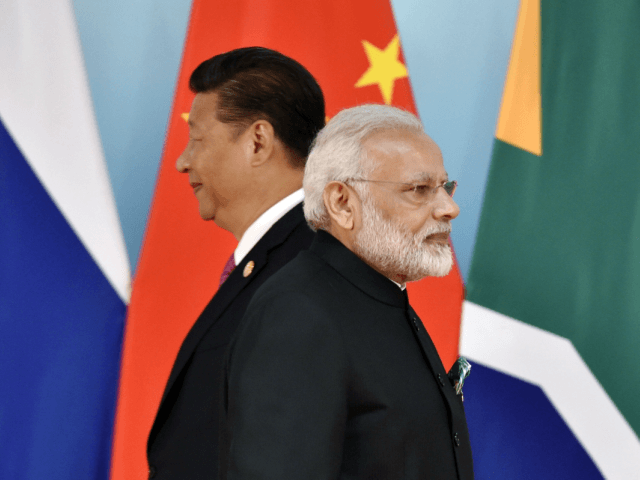China reportedly began a large-scale mining operation along its disputed border with northeastern India this month that may renew tensions between the two nuclear-armed neighbors, less than a month after the top leaders from both nation’s discussed peace.
Beijing’s mining efforts have already started on its side of the Indian state of Arunachal Pradesh (AP), home to a vast trove of gold, silver, and other precious minerals valued at an estimated $60 billion, the South China Morning Post (SCMP) reported Sunday.
China claims parts of AP as part of southern Tibet.
The Morning Post noted:
The unprecedented scale of the new mines follows years of heavy investment by the Chinese government in roads and other infrastructure in the area.
People familiar with the project say the mines are part of an ambitious plan by Beijing to reclaim South Tibet, a sizable chunk of disputed territory currently under Indian control.
China’s moves to lay claim to the region’s natural resources while rapidly building up infrastructure could turn it into “another South China Sea”, they said.
China’s mining operations are expected to take place in Lhunze county, described by SCMP as:
A traditional military stronghold heavily garrisoned by the People’s Liberation Army, is part of a determined endeavor by Beijing to regain full control of South Tibet, or Arunachal Pradesh – currently an Indian state as large as Austria with original forests, fertile farmland and rich natural resources.
Late last year, Indian authorities reportedly thwarted an attempt by Chinese workers to build a road on the Indian side of the China-India international boundary months after the two nations de-escalated a standoff at the Doklam region that sits along their border.
China’s decision to deploy troops to accompany workers seeking to extend a road into the Doklam territory claimed by Beijing and India’s ally Bhutan triggered a nearly 70-day standoff between India and China.
Beijing beefed up its military presence in the area after the confrontation.
Nevertheless, Indian Prime Minister Narendra Modi and Chinese President Xi Jinping appeared to put tensions behind them after they held an informal meeting late last month.
After the April 29 summit, top representatives from both countries indicated that the leaders endorsed ongoing efforts to reach a “mutually acceptable settlement” to the border tensions.
“The two leaders also underscored that in the meantime it is important to maintain peace and tranquility in all areas of the India-China border region,” Indian Foreign Secretary Vijay Gokhale reportedly declared.
Referring to Beijing’s mining efforts, SCMP noted, “Most of the precious minerals – which include rare earths used to make hi-tech products – are hidden under Lhunze county, a military stronghold China took from India by force nearly 60 years ago.”
India and China went to war in 1962 over a border dispute the ended in a ceasefire.
China has been known to chase after precious minerals across Asia, including Afghanistan.
To the dismay of the Chinese, India continues to oppose Beijing’s ambitious China-Pakistan Economic Corridor (CPEC), a component of the multi-trillion dollar One Belt One Road (OBOR) project, also known as the Belt and Road Initiative (BRI).
India opposes CPEC because it is expected to run through Pakistan-controlled Kashmir, a region claimed by China, its ally Pakistan, and their rival New Delhi.
The Morning Post’s report about China’s mining operations comes amid ongoing clashes between mortal enemies India and Pakistan in Muslim-majority Kashmir despite a ceasefire proposed by the Modi government for the ongoing holy month of Ramadan.
PM Modi renewed calls for peace during his recent visit to India-controlled Kashmir. Pro-Pakistan separatists in the area protested Modi’s presence.
India accuses Pakistan of backing Islamic terrorists in Kashmir. Meanwhile, Islamabad blames New Delhi for violently oppressing pro-Pakistan separatists.
Hindu extremist groups reportedly maintain an affiliation with Modi’s ruling Bharatiya Janata Party (BJP).

COMMENTS
Please let us know if you're having issues with commenting.